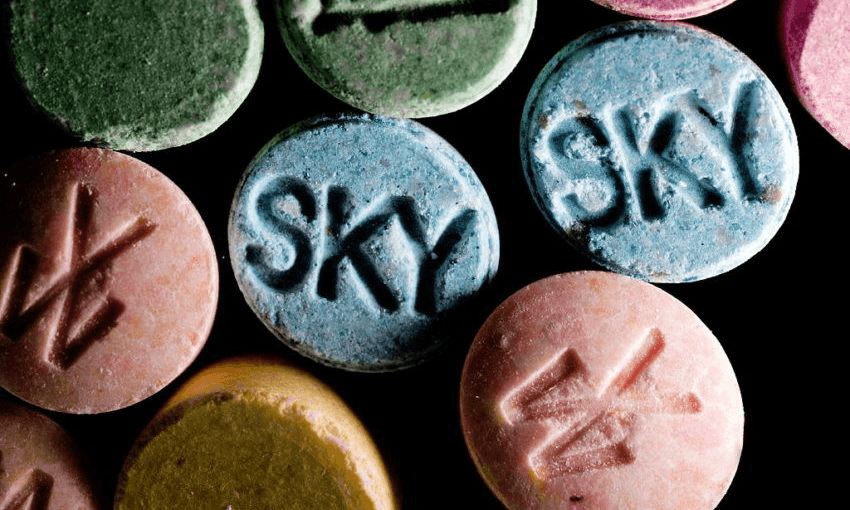Anecdotally, it’s difficult to access MDMA in New Zealand at the moment. Statistically, that’s probably because a lot of you are buying it.
It’s almost New Year’s, which means it’s almost festival season. Despite Covid-19 creating the absolute year from hell, thousands of holidaymakers will soon be converging on muddy fields from the far north to the deep south to listen to loud doof doof music. I couldn’t think of anything worse.
If you’re one of those prospective moshers, you’re probably going to be exposed to drugs, either indirectly or directly.
Sources have told me (i.e. a brief survey of people who may know these things) that it’s currently hard to track down MDMA, likely due to the impending tidal wave of summer celebrations. According to the Drug Foundation’s 2020 state of the nation report, that checks out; a lot of New Zealanders are doing E. Between November 2019 and January 2020, MDMA was the second most commonly detected drug in wastewater testing, with an estimated 8.7kg consumed on average per week at sites tested (up from 4kg the year before).
Truthfully, as the recent legalisation of drug testing at festivals should have taught us, drugs aren’t going away. Instead, it’s about minimising the dangers that drug use brings.
While I can’t definitively verify that there is, in fact, a shortage of MDMA, this safety warning should be useful regardless. High Alert, a website run by Drug Information and Alerts Aotearoa New Zealand, says the “biggest concern” about a possible MDMA shortage over the summer is not the fact that it means more people could be taking the drug, but that it could mean people aren’t taking it. “Just because there may be less MDMA in New Zealand, does not mean that less ‘MDMA’ will be bought and sold. A lack of normal supply can see people seek substances outside their normal ‘circle’ and take more risks when buying and consuming,” a spokesperson told The Spinoff.
“People can and will sell adulterated substances to make their supply go further (i.e. MDMA cut with caffeine), substances that mimic MDMA but have greater health risks (i.e cathinones such as eutylone and n-ethylheptedrone being sold as MDMA) and substances that just flat out do not contain MDMA or any other psychoactive chemical (such as the toxic chemical methylenedianiline).”
It is also possible, the spokesperson adds, that people will consider taking substances they potentially would not normally consume, and possibly have no experience with. “All of the above scenarios can have serious consequences, including death.”
It’s a concern shared by Wendy Allison, the managing director of Know Your Stuff. That’s the volunteer group hoping to test your drugs at a festival over summer, free of charge and without the risk of police interference. Allison says that substitute drugs are fairly common in New Zealand. “N-ethylpentylone, eutylone, and mephedrone are all currently being mis-sold as MDMA,” she says. It’s not without precedent, either. A so-called “MDMA drought” in the late 2000s led to the emergence of harmful substances such as PMA. “This caused the black market to adapt and produce other less studied and potentially more dangerous chemicals,” says High Alert.
Then, there’s the risk of “high dose” pills being sold; some can contain three times the normal “dose” of MDMA.
If you do actually have MDMA, the dangers lessen. Both Wendy Allison and High Rate say that, as far as the risks go, E is a relatively “low-risk” drug. But, low-risk does not mean “no risk”.
“The main risk is that the body can lose its ability to regulate its own temperature and people can get dangerously hot very quickly, especially when dancing or on hot days,” says Allison. “Another risk, especially for those who repeat dose, or who are taking SSRIs, is serotonin syndrome.”
The safest way to take MDMA is orally, Allison says, starting with a fraction of a dose and waiting at least an hour to see what happens. “Make sure someone knows what you are doing. Stay hydrated (200-300ml an hour is adequate), avoid taking with alcohol or other drugs, especially stimulants, and stick with your friends – get them medical attention if they show signs of confusion and anxiety, loss of motor control, or changes to internal systems such as suddenly elevated temperature, sweating, diarrhoea or rapid heart rate.”
